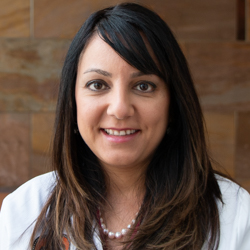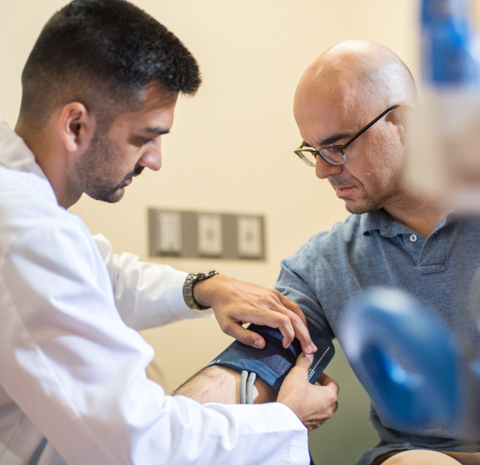Bladder cancer affects nearly 84,000 people in the United States each year, making it the sixth most common cancer. Most people survive it, but unfortunately, many lose their bladders.
Neda Hashemi, MD, and her team at The University of New Mexico Comprehensive Cancer Center are now offering several clinical trials, including one that will give people with bladder cancer a chance to fight their disease and keep their bladders.
Hashemi, an assistant professor and medical oncologist who specializes in treating prostate, bladder, testicular and kidney cancers, leads the UNM Cancer Center Genitourinary Cancers Team.
“Right now, for patients who have invasive bladder cancer that is not metastatic, the preferred treatment is chemotherapy followed by removing the bladder,” she says.
For those whose lymph nodes show signs that bladder cancer has started to spread, deciding on the best treatment is more difficult because removing the bladder is not as likely to cure them, Hashemi says. For those people, she says, chemo-radiation can be considered to reduce the tumor size and spread.
So certain people whose lymph nodes are affected and those who cannot have surgery for other reasons are treated with chemo-radiation, which doesn’t have as high a cure rate as bladder removal. It also causes scars to form on the bladder, making future bladder removal surgery difficult.
In a new clinical trial sponsored by the National Cancer Institute, Hashemi and her team offer people who have localized bladder cancer that has spread to the lymph nodes a chance to keep their bladders.
Trial participants will first receive chemotherapy, which is the standard treatment. After that, they will be given chemo-radiation with or without immune therapy and watched closely. All the drugs have been approved by the U.S. Food and Drug Administration (FDA).
“We think immunotherapy has synergistic effects with radiation in patients who have regional-node bladder cancer,” Hashemi says.
People on the clinical trial whose cancer does not respond to the chemo-radiation-immune therapy combination can then have surgery to remove their bladders before scars have a chance to develop, she says.
A second clinical trial will help people who have just been diagnosed with metastatic bladder cancer. It will give people either an FDA-approved drug or the drug plus an FDA-approved immune therapy.
The FDA-approved drug, enfortumab vedotin, is used by itself as a third treatment option for bladder cancer and has been shown to have an effect in half of people treated. But in a Phase 2 clinical trial in which enfotumab vodotin was paired with pembrolizumab, an FDA-approved immune therapy for bladder cancer, the two drugs together showed an effect in up to 70% of people. Hashemi says that is a very good response rate for bladder cancer.
The new clinical trial will test combinations of enfortumab vedotin with and without pembrolizumab and other drugs to see if the immune therapy can help even more people.
People must meet certain criteria to join the clinical trials, Hashemi says, but the trials give them more options throughout their treatment.
“If I am a patient,” Hashemi says, “I would like to know that the treatment I am receiving is the treatment that is personalized for me, based on my cancer response.”

Neda Hashemi, MD, is an assistant professor in Department of Internal Medicine, Division of Hematology/Oncology, and the leader of the Genitourinary Clinical Working Group at the UNM Comprehensive Cancer Center. She and her team build and maintain a clinical trial menu that meets the unique needs of New Mexicans with genitourinary cancers. Hashemi collaborates with physicians in many of New Mexico’s communities through the New Mexico Cancer Care Alliance to offer clinical trials for prostate, bladder, testicular and kidney cancers to all New Mexicans.
About the Clinical Trials
“A Study of Chemotherapy and Radiation Therapy Compared to Chemotherapy and Radiation Therapy Plus MEDI4736 (Durvalumab) Immunotherapy for Bladder Cancer Which Has Spread to the Lymph Nodes (The INSPIRE Study)” is now open at the UNM Comprehensive Cancer Center. Read more about this clinical trial (NCT04216290).
“A Study of Enfortumab Vedotin Alone or With Other Therapies for Treatment of Urothelial Cancer (EV-103)” is now open at the UNM Comprehensive Cancer Center. Read more about this clinical trial (NCT03288545).
UNM Comprehensive Cancer Center
The University of New Mexico Comprehensive Cancer Center is the Official Cancer Center of New Mexico and the only National Cancer Institute-designated Cancer Center in a 500-mile radius.
Its more than 136 board-certified oncology specialty physicians include cancer surgeons in every specialty (abdominal, thoracic, bone and soft tissue, neurosurgery, genitourinary, gynecology, and head and neck cancers), adult and pediatric hematologists/medical oncologists, gynecologic oncologists, and radiation oncologists. They, along with more than 600 other cancer healthcare professionals (nurses, pharmacists, nutritionists, navigators, psychologists and social workers), provide treatment to 65% of New Mexico’s cancer patients from all across the state and partner with community health systems statewide to provide cancer care closer to home. They treated almost 15,000 patients in more than 100,000 ambulatory clinic visits in addition to in-patient hospitalizations at UNM Hospital.
A total of nearly 1,855 patients participated in cancer clinical trials testing new cancer treatments that include tests of novel cancer prevention strategies and cancer genome sequencing.
The more than 123 cancer research scientists affiliated with the UNMCCC were awarded $38.2 million in federal and private grants and contracts for cancer research projects. Since 2015, they have published nearly 1000 manuscripts, and promoting economic development, they filed 136 new patents and launched 10 new biotechnology start-up companies.
Finally, the physicians, scientists and staff have provided education and training experiences to more than 500 high school, undergraduate, graduate, and postdoctoral fellowship students in cancer research and cancer health care delivery.
